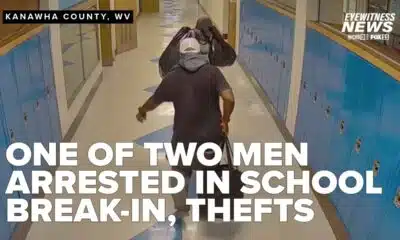News from the South - Texas News Feed
School voucher bill debate centers on wealthy Texans
Debate on House’s school voucher bill centers on a question: Should wealthy Texans be included?
“Debate on House’s school voucher bill centers on a question: Should wealthy Texans be included?” was first published by The Texas Tribune, a nonprofit, nonpartisan media organization that informs Texans — and engages with them — about public policy, politics, government and statewide issues.
Sign up for The Brief, The Texas Tribune’s daily newsletter that keeps readers up to speed on the most essential Texas news.
With diminished power to block school vouchers this legislative session, Texas Democrats sought Tuesday to frame public discussion on the contentious issue around one question: Should the state allow wealthy Texans to pay for their children’s private education using taxpayer dollars?
Lawmakers sparred over that question during a tense, highly attended public hearing on House Bill 3, one of the two main proposals seeking to create a school voucher program, a top priority for Texas’ Republican leadership.
The House’s voucher plan would allocate $1 billion toward education savings accounts that some families could use for private school tuition and other educational expenses, like textbooks, transportation and therapy. Under the proposal, most participating students would receive roughly $10,893 every year, an amount equal to 85% of what public schools get for each student through state and local funding, with additional money set aside for students with disabilities and home-schoolers.
Any child eligible to attend a public school could apply to the program. So could those enrolled in a public school’s pre-K program and families with children attending private schools.
Supporters have long pitched vouchers as a tool that will primarily benefit low-income students — and not just, as their critics argue and research in other states shows, channel taxpayer dollars to families already paying for their kids’ private education.
[School choice, vouchers and the future of Texas education]
Tuesday presented the first opportunity this session for lawmakers in the House, where efforts to establish a voucher program repeatedly failed two years ago, to hear testimony from education experts and the public on the latest proposal.
“My intent is to provide families with the opportunity to choose the best possible educational setting for their child,” said Republican Rep. Brad Buckley of Salado, the bill’s author and chair of the House Public Education Committee. “I believe House Bill 3 provides this choice while prioritizing Texas’ most high-needs and vulnerable students.”
The daylong hearing, with hundreds scheduled to testify late into the night, featured discussions about the segregation-era roots of vouchers; Democratic skepticism about the motivations of the late “school choice” advocate Milton Friedman; Republican criticism of a national voucher expert and critic who cited a decade of research showing unfavorable academic results in such programs; and pleas to pour more resources into public education. Private school students and officials, meanwhile, raved about the opportunity the legislation hopes to provide them.
“Families should not have to pay twice — once in taxes for a system that may not meet their child’s needs, and again, for tuition, for the education they truly want,” said Brian Archer, an administrator for Joshua Christian Academy, located near Fort Worth. “HB 3 empowers parents, not the government, to make the best decision for their child’s education.”
But by investing state dollars in private schools, others said, Texas officials would leave public schools to operate with fewer resources and reduced funding. Legislative budget experts recently predicted that public schools, which receive money based on attendance, may lose dollars if kids leave to participate in the state’s voucher program.
“It would be stealing public funds from the award-winning pre-K my own son currently attends,” said Luisa White, a public school educator in Corpus Christi. “It would be stealing public funds from the elementary school where my little boy will begin kindergarten next year, and it would be stealing public funds from the high school I currently serve.”
Democrats spent hours interrogating what they see as contradictions and weaknesses in the legislation, focusing heavily on the evidence available from other states that have implemented large-scale voucher programs.
Studies have shown little evidence that vouchers lead to improved test scores for low-income students, with some of the most negative academic outcomes occurring as vouchers have expanded in the last decade. The bills do not impose any admission or enrollment requirements on the private schools that choose to participate in the program, meaning they would face no state pressure to adjust their costs, ensure more racial and ethnic diversity or accept students from different faith traditions.
While the measure seeks to prioritize students with disabilities and those it defines as “low income,” the bill does not say what would happen to children who make it through the eligibility process and cannot find a private school in Texas to accommodate their needs. However, lawmakers who support the measure have said those students would not participate in the program.
That has concerned public education advocates, who have underscored the potential impact on kids needing special education services. Unlike public schools, private schools do not have to follow federal laws seeking to ensure those students receive adequate evaluations and educational services.
“They rely on the wraparound services our public schools provide — mental health support, special education interventions, transportation, meals and a team of educators fighting for their success,” said Tania Tasneem, a teacher of 18 years who testified about the academic success of a student with a disability she worked closely with. “Diverting public funds through ESAs weakens the very system that held her up.”
But the most pressing topic of discussion Tuesday was access. Many of the students currently benefiting from voucher programs in other states had already attended private schools before signing up, meaning their families had previously committed to paying thousands of dollars in tuition without government assistance.
Democrats said Texas appears headed in the same direction.
Rep. James Talarico, the Austin Democrat helping lead the voucher opposition, criticized the bill for lacking provisions to ensure private schools accept students eligible for the program, as well as the argument that Texas does not need such accountability requirements because families will ultimately decide which private schools meet their needs.
“We are allowing the private school to have the ultimate power in this equation, and so I resent the effort to use parents as a shield for this push for privatization,” he said.
Democrats proposed several ideas they said could align the bill with Republicans’ stated goal of serving the neediest students. They said the legislation could place an income limit on the families who can participate, prohibit participating private schools from denying students based on their family’s inability to pay tuition or impose enrollment requirements. Better yet, they said, lawmakers could instead invest the money from the proposed voucher program to help cover Texas’ $2 billion special education funding gap.
“Do you think our taxpayer dollars should go to a family making over $500,000 a year, who are already sending their kids to private school?” Talarico asked Buckley. “Not a low-income family. We could have that conversation. Not even a working-class, middle-class family. We could have that conversation. But your bill allows for, literally, millionaires to take money that could go to public schools to subsidize their private school tuition.”
Buckley and his fellow Republicans swiftly rejected those criticisms.
“Every parent in Texas deserves the right to make one of the most important decisions that they have to do as a parent, to have that freedom to make a decision on … where their kids are educated,” Buckley said. “After four years of runaway inflation, there are families that earn $120,000-$150,000 a year, and you have four or five kids, it’s a struggle. It’s difficult for us to make those judgments. But I do know that I trust parents to make the best decision for their kids.”
Rep. Alan Schoolcraft, R-McQueeney, criticized what he called the “millionaires and billionaires argument,” saying many rich families also enroll their children in public schools and pay significant money in property taxes that benefit their local campuses.
“It seems awfully petty to me to spend all this time and effort worrying about this infinitesimal little group of people who are putting so much more into” public education, he said.
Rep. Jeff Leach, a Plano Republican, said he loves public schools, which his children attend, but questioned why people are afraid of “true freedom, and choice and competition.”
“Right now, the fact is public schools have choices that parents don’t have. We have over 1,200 independent school districts in this state, each of whom the state has empowered to make certain decisions parents in those districts disagree with,” Leach said, using examples like districts that have decided to adopt four-day school weeks or not to participate in the state’s merit pay program for teachers.
“I hear this argument about this bill being all about billionaires, and millionaires and special interests. That’s not why I’m supporting this bill,” he added. “We can be friends and advocates, proudly so of our public schools, and also support the right, and the choice, and the freedom of Texas families to direct their kids’ education.”
Democrats and many people attending the hearing, who would often voice their frustrations quietly in the room, didn’t appear to support that argument.
Rep. Gina Hinojosa, D-Austin, said it was unfair that the voucher bill would allocate state funding to help market the program to families while public schools struggle to receive support from Texas officials in the work they do educating the state’s 5.5 million students.
“How nice would it be?” she asked.
Rep. Diego Bernal, a Democrat from San Antonio, repeatedly asked about how the state would ensure low-income families receive access to the program if the law doesn’t require private schools to help them with the costs. The average private school tuition in Texas sits at roughly $11,340, according to Private School Review, so the House’s voucher proposal may not fully cover the price at some campuses.
“Unless there’s a policy to do that, they’re asking me to bank on their goodwill. And I don’t doubt that that exists, but that’s not how you make policy,” Bernal said. “You can’t make policy like this — hoping that someone finds it in their heart to really make it happen.”
Talarico condemned his colleagues who support vouchers for choosing to invest billions of dollars into such a program instead of directing that funding to other critical areas.
“Instead of putting this toward public schools, roads, health care, water, we are sending it to parents who are already sending their kids to private school,” he said. “You can defend that. I think that is a catastrophic decision, an immoral decision.”
We can’t wait to welcome you to the 15th annual Texas Tribune Festival, Texas’ breakout ideas and politics event happening Nov. 13–15 in downtown Austin. Step inside the conversations shaping the future of education, the economy, health care, energy, technology, public safety, culture, the arts and so much more.
Hear from our CEO, Sonal Shah, on TribFest 2025.
TribFest 2025 is presented by JPMorganChase.
This article originally appeared in The Texas Tribune at https://www.texastribune.org/2025/03/11/texas-house-school-voucher-bill/.
The Texas Tribune is a member-supported, nonpartisan newsroom informing and engaging Texans on state politics and policy. Learn more at texastribune.org.
The post School voucher bill debate centers on wealthy Texans appeared first on feeds.texastribune.org
News from the South - Texas News Feed
Scammers target volunteer fire department helping flood victims
SUMMARY: The Office of Attorney General Ken Paxton is investigating scammers who targeted the Center Point Volunteer Fire Department’s flood relief fundraiser after the devastating July 4 flood in Kerr County, which caused over 100 deaths. Scammers created fake Venmo accounts to divert donations, though Venmo shut them down quickly. Paxton vowed to use full authority against such fraud. The fire department’s genuine fundraiser continues via GoFundMe and mail donations. The Better Business Bureau warns of sophisticated AI-driven scams cloning websites and hijacking links. Donors are urged to verify payment sites, avoid wiring money, research charities, and be cautious of urgent appeals to prevent fraud.
The post Scammers target volunteer fire department helping flood victims appeared first on www.kxan.com
News from the South - Texas News Feed
Democratic doctor challenging GOP Rep. Monica De La Cruz
“Harlingen doctor becomes first Democrat to challenge GOP Rep. Monica De La Cruz for South Texas congressional seat” was first published by The Texas Tribune, a nonprofit, nonpartisan media organization that informs Texans — and engages with them — about public policy, politics, government and statewide issues.
Sign up for The Brief, The Texas Tribune’s daily newsletter that keeps readers up to speed on the most essential Texas news.
Ada Cuellar, a Harlingen-based emergency physician, launched her campaign for Texas’ 15th Congressional District on Thursday, becoming the first Democrat to run for the South Texas seat that her party is targeting in the 2026 midterms.
Anchored in Hidalgo County along the border and running north to the edge of San Antonio, the district — represented by Rep. Monica De La Cruz, R-Edinburg — has been emblematic of Democrats’ recent struggles throughout the Rio Grande Valley and with Latino voters generally. De La Cruz first won office in 2022, becoming the first Republican to represent the district after it was redrawn to favor Republicans.
The seat has been in Democrats’ crosshairs ever since. But South Texas was the epicenter of a national rightward shift in 2024 among Latinos, who make up about three-quarters of the 15th District’s eligible voting-age population, according to U.S. Census Bureau data. President Donald Trump was the first Republican to win Hidalgo County in decades, improving from a 28% vote share in 2016 to 51% last year.
Whoever wins the Democratic nomination will likely face an uphill battle. De La Cruz won reelection by 14 points in 2024, despite the Democratic Congressional Campaign Committee and other national groups targeting it as a potential pickup. The district leans Republican by a 7-point margin, according to the Cook Partisan Voting Index.
While Cuellar — who has no relation to Rep. Henry Cuellar, D-Laredo — is the first candidate to officially announce, Tejano music star Bobby Pulido has also been floated as a potential candidate. Pulido said he planned to enter politics in 2026, and he has been heavily recruited by Democrats, according to Politico.
Cuellar lives outside the district boundary, in the district of Rep. Vicente Gonzalez, D-McAllen. She is from Weslaco and went to college in Edinburg.
Members of Congress do not have to live in the district they represent, though residing outside the boundaries can open candidates to attacks from their opponents.
De La Cruz is the only Texas Republican the DCCC currently lists among its 2026 targets. But the spectre of redistricting, which could put more seats in play and upend the state’s political map, is hanging over both parties. South Texas is a key area where Republican map-drawers will likely try to draw friendlier seats by targeting De La Cruz’s Democratic neighbors, meaning the contours of the 15th District could change.
Under any new map, the district’s population is likely to remain overwhelmingly Hispanic — meaning Democrats will need to reverse their recent slide to have any chance of recapturing the seat.
Cuellar, a 43-year-old Rio Grande Valley native, believes Latino voters, in particular, were looking for change last cycle as they felt the bite of high costs fueled by inflation. She believes Democrats can position themselves as the party of change in 2026, especially on issues like health care, after Republicans including De La Cruz voted for Medicaid cuts as part of Trump’s recently enacted megabill.
“People are frustrated with health care costs, inflation, the economy, how difficult it is to succeed,” Cuellar said. “And I think a lot of frustrations were directed towards the Democratic Party.”
National Republicans expressed confidence they would hold onto the seat.
“Monica De La Cruz remains a steadfast advocate for the people of South Texas, consistently delivering commonsense results,” Zach Bannon, a spokesperson for the National Republican Congressional Committee, said in a statement. “Voters are eager to send her back to Washington to continue her work and will resoundingly reject any out of touch Democrat in the race.”
Democrats flipped the U.S. House in 2018 — including through pickups in Texas — largely by talking about Republicans’ efforts to quash the Affordable Care Act. Democrats hope to follow a similar playbook in 2026 by homing in on the Medicaid and ACA cuts in the megabill. Groups have been actively recruiting physicians like Cuellar to run for office as part of that pitch.
During her campaign, Cuellar said she also plans to discuss the need for a county hospital and more doctors in the district, along with plans to make health care more affordable.
Disclosure: Politico has been a financial supporter of The Texas Tribune, a nonprofit, nonpartisan news organization that is funded in part by donations from members, foundations and corporate sponsors. Financial supporters play no role in the Tribune’s journalism. Find a complete list of them here.
The lineup for The Texas Tribune Festival continues to grow! Be there when all-star leaders, innovators and newsmakers take the stage in downtown Austin, Nov. 13–15. The newest additions include comedian, actor and writer John Mulaney; Dallas mayor Eric Johnson; U.S. Sen. Amy Klobuchar, D-Minnesota; New York Media Editor-at-Large Kara Swisher; and U.S. Rep. Veronica Escobar, D-El Paso. Get your tickets today!
TribFest 2025 is presented by JPMorganChase.
This article originally appeared in The Texas Tribune at https://www.texastribune.org/2025/07/17/ada-cuellar-democrat-monica-de-la-cruz-south-texas-congress/.
The Texas Tribune is a member-supported, nonpartisan newsroom informing and engaging Texans on state politics and policy. Learn more at texastribune.org.
The post Democratic doctor challenging GOP Rep. Monica De La Cruz appeared first on feeds.texastribune.org
Note: The following A.I. based commentary is not part of the original article, reproduced above, but is offered in the hopes that it will promote greater media literacy and critical thinking, by making any potential bias more visible to the reader –Staff Editor.
Political Bias Rating: Center-Left
This article from The Texas Tribune leans Center-Left, primarily due to its emphasis on Democratic perspectives, framing of Republican actions, and favorable attention to Democratic candidate Ada Cuellar’s campaign. While the article includes factual data and references to Republican figures like Rep. Monica De La Cruz, the narrative highlights Democratic strategies, critiques of Republican policies (especially Medicaid cuts), and Cuellar’s policy priorities without equally presenting counterpoints from her Republican opponent. The language is measured and journalistic, but the thematic focus and selection of quotes subtly favor Democratic viewpoints.
News from the South - Texas News Feed
Court orders release of Uvalde school shooting records
“Appeals court orders release of Uvalde school shooting records” was first published by The Texas Tribune, a nonprofit, nonpartisan media organization that informs Texans — and engages with them — about public policy, politics, government and statewide issues.
Sign up for The Brief, The Texas Tribune’s daily newsletter that keeps readers up to speed on the most essential Texas news.
A state appeals court judge on Wednesday ordered Uvalde County and its school district to release records and documents related to the 2022 Robb Elementary School shooting, affirming a previous trial court order.
A coalition of 18 news organizations, including The Texas Tribune, sued the City of Uvalde, Uvalde County and the Uvalde Consolidated Independent School District in 2022 for access to body camera footage, 911 call records and communications made during the school shooting. Law enforcements’ response to Texas’ deadliest school shooting, in which 19 students and two teachers were killed, has been scrutinized extensively for failures in communication that delayed response time while the shooter was still in two classrooms with children.
Uvalde County District Attorney Christina Mitchell had opposed providing the records, pointing to criminal proceedings against former Uvalde school district Police Chief Pete Arredondo that she said could be hampered by the documents’ release. But Judge Velia Meza with Texas’ Fourth Court of Appeals wrote in the opinion for the case that the criminal proceedings and a separate lawsuit were not enough reasons to withhold the records.
“In response, these entities offered only minimal justification — citing a grand jury investigation and a civil lawsuit — without providing legal or evidentiary support for withholding the information,” Meza wrote.
Arredondo is facing several felony charges of child endangerment, with a trial date set for October.
In a statement, Laura Prather, a media law attorney with Haynes Boone representing the news organizations, said the ruling sends a clear message to government officials that “vague legal claims” cannot be used to withhold records.
“The public has waited more than three years for answers about what went wrong that day,” Prather said. “This decision brings us one step closer to those answers and preventing future tragedies.”
A spokesperson for the Uvalde school district said its school board and superintendent have scheduled a discussion about the requested records during their public meeting on July 21. The Uvalde County Sheriff’s Office did not respond to a request for comment. The order from Meza did not specify when the records would need to be released.
The lineup for The Texas Tribune Festival continues to grow! Be there when all-star leaders, innovators and newsmakers take the stage in downtown Austin, Nov. 13–15. The newest additions include comedian, actor and writer John Mulaney; Dallas mayor Eric Johnson; U.S. Sen. Amy Klobuchar, D-Minnesota; New York Media Editor-at-Large Kara Swisher; and U.S. Rep. Veronica Escobar, D-El Paso. Get your tickets today!
TribFest 2025 is presented by JPMorganChase.
This article originally appeared in The Texas Tribune at https://www.texastribune.org/2025/07/16/uvalde-school-shootings-records-release/.
The Texas Tribune is a member-supported, nonpartisan newsroom informing and engaging Texans on state politics and policy. Learn more at texastribune.org.
The post Court orders release of Uvalde school shooting records appeared first on feeds.texastribune.org
Note: The following A.I. based commentary is not part of the original article, reproduced above, but is offered in the hopes that it will promote greater media literacy and critical thinking, by making any potential bias more visible to the reader –Staff Editor.
Political Bias Rating: Centrist
This article primarily presents factual reporting on a legal decision involving the release of records related to the Uvalde school shooting. The tone is neutral and focused on public interest and transparency without showing ideological leanings or framing the story to favor a particular political viewpoint. It reports on actions taken by courts, law enforcement, and media organizations without editorializing or expressing bias. While the topic touches on sensitive issues like law enforcement accountability, the coverage remains straightforward and balanced, adhering to journalistic standards of impartiality.
-
News from the South - Tennessee News Feed5 days ago
Bread sold at Walmart, Kroger stores in TN, KY recalled over undeclared tree nut
-
News from the South - Arkansas News Feed7 days ago
Man shot and killed in Benton County, near Rogers
-
News from the South - Georgia News Feed1 day ago
Aiken County family fleeing to Mexico due to Trump immigration policies
-
News from the South - Alabama News Feed6 days ago
Girls Hold Lemonade Stand for St. Jude Hospital | July 12, 2025 | News 19 at 10 p.m. – Weekend
-
News from the South - Georgia News Feed7 days ago
Anti-ICE demonstrators march to Beaufort County Sheriff's Office
-
News from the South - Oklahoma News Feed7 days ago
Police say couple had 50+ animals living in home
-
Mississippi Today1 day ago
Driver’s license office moves to downtown Jackson
-
Mississippi Today4 days ago
Coast judge upholds secrecy in politically charged case. Media appeals ruling.









































